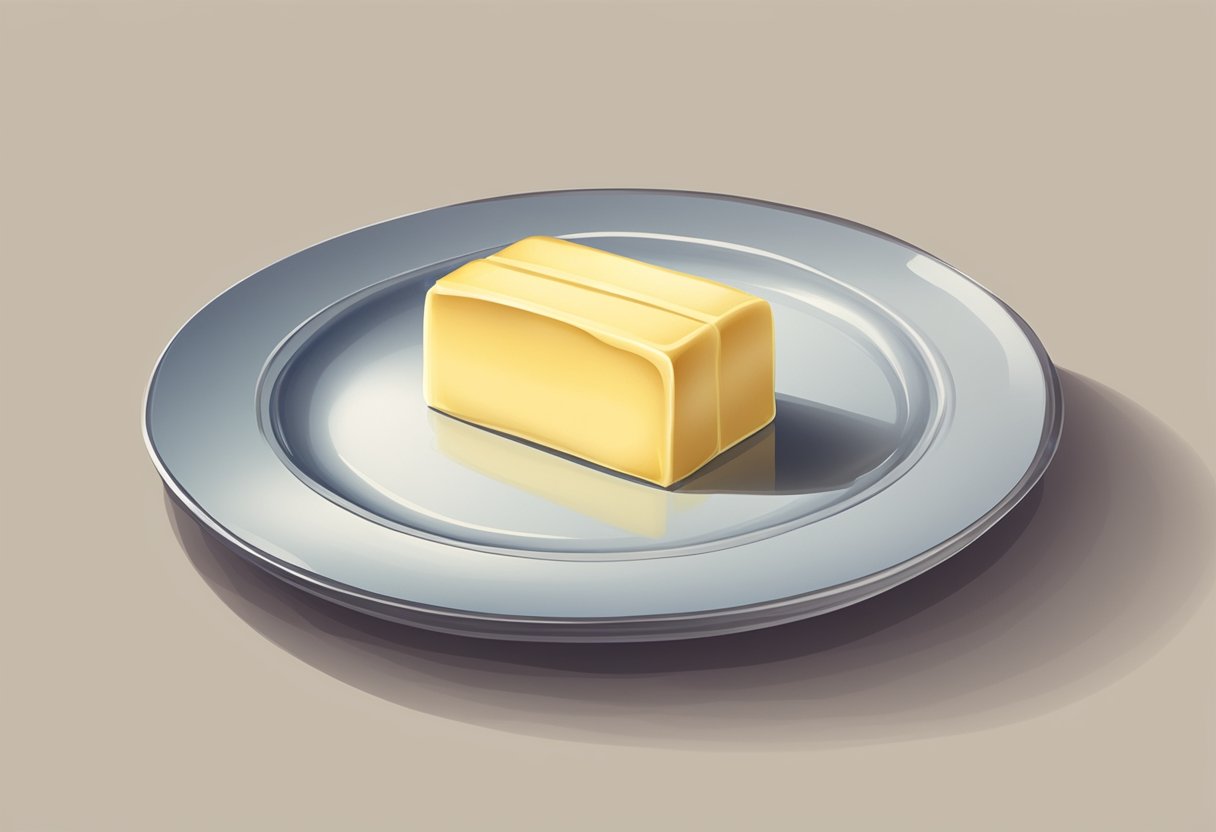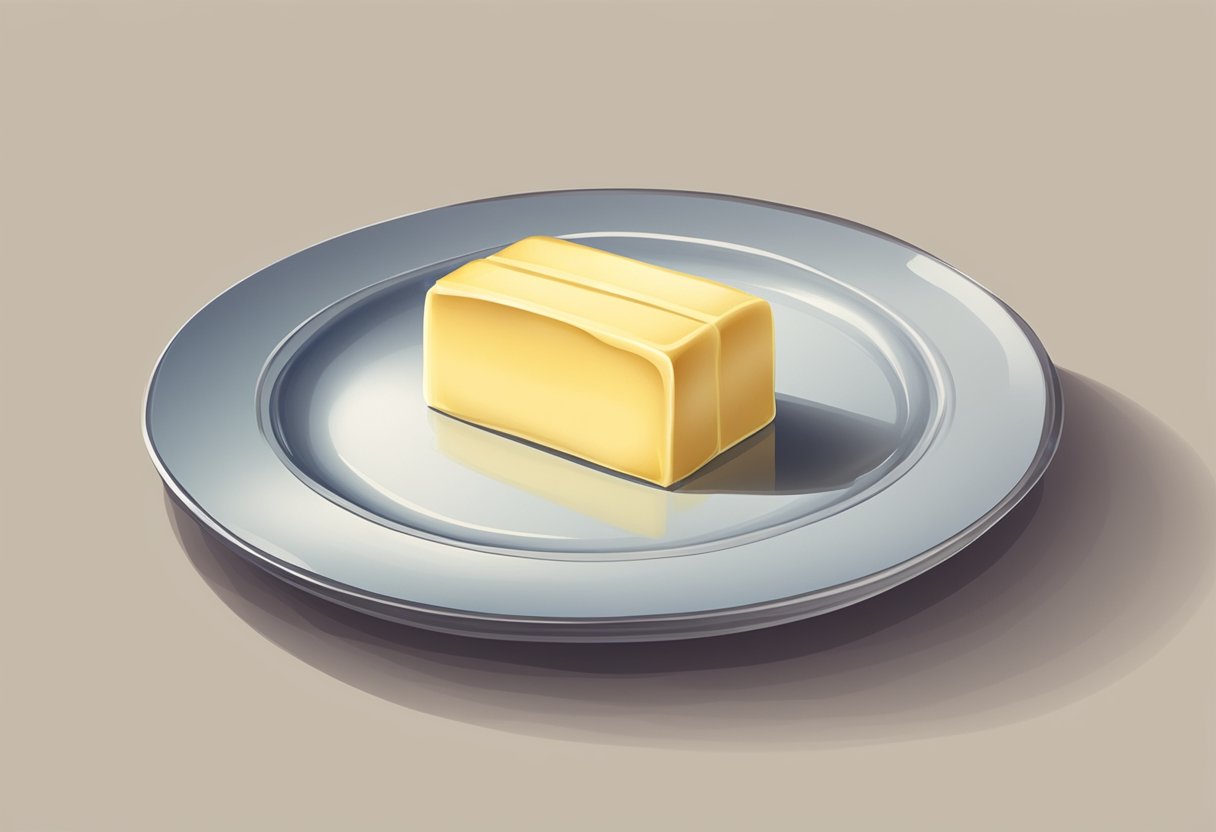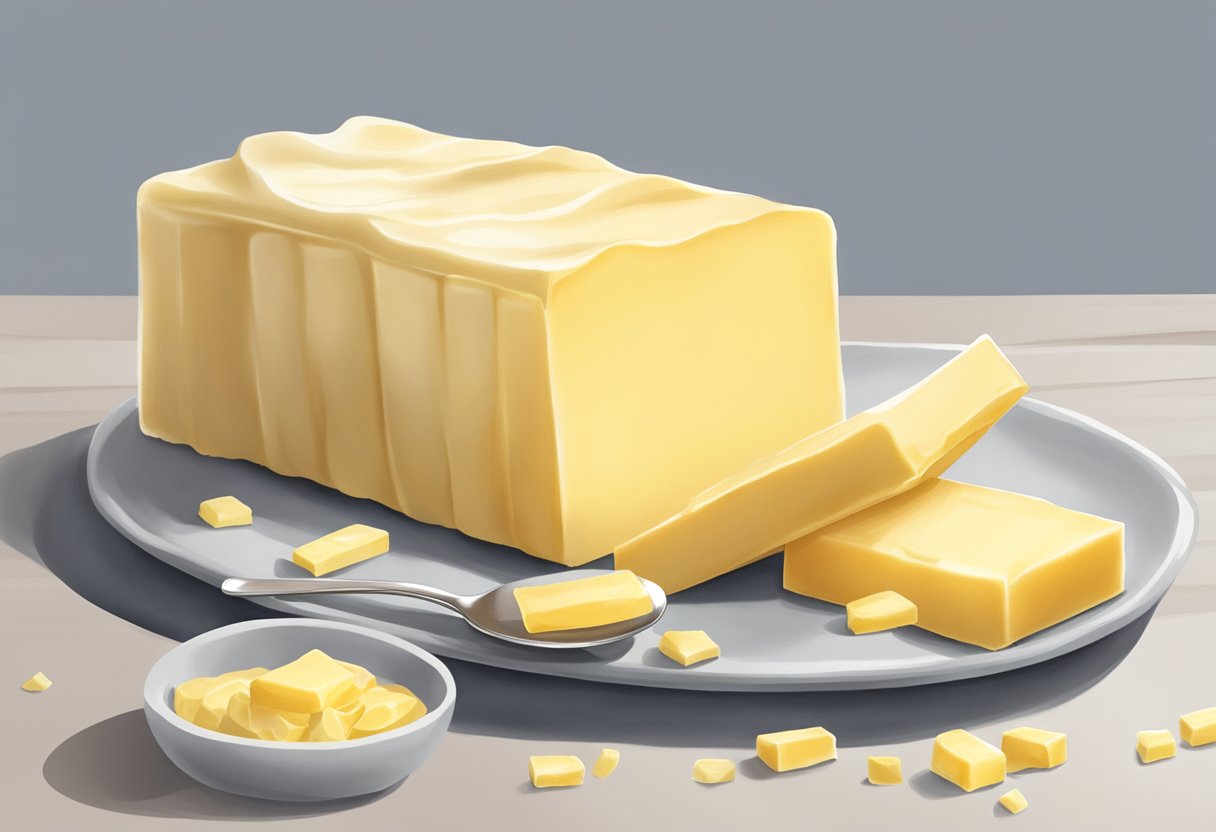Is Butter Keto Friendly? A Clear Answer for Your Diet

Butter is a beloved ingredient in many kitchens around the world. It is used in a variety of dishes, from baking to cooking, and is often considered a staple in many households. However, with the rise of the ketogenic diet, many people are wondering if butter is keto-friendly.

The ketogenic diet is a low-carb, high-fat diet that has gained popularity in recent years due to its potential health benefits. The diet involves cutting back on carbohydrates and increasing the intake of healthy fats to promote weight loss and improve overall health. With its high fat content, butter seems like it would be a natural fit for a keto diet. But is it really keto-friendly?
To answer this question, it is important to understand the nutritional content of butter and how it fits into a keto diet. This article will explore the topic in depth, examining the pros and cons of including butter in a keto diet and offering practical advice for those who want to incorporate butter into their ketogenic lifestyle.
What Is Keto Diet
A ketogenic diet, commonly known as keto, is a low-carb, high-fat diet that has been shown to help individuals lose weight and improve their overall health. The keto diet involves reducing carbohydrate intake and replacing it with healthy fats, which puts the body into a metabolic state called ketosis.
In ketosis, the body burns fat for energy instead of glucose from carbohydrates. This process can lead to weight loss, improved insulin sensitivity, and lower blood sugar and insulin levels.
The keto diet typically involves consuming 70-75% of calories from fat, 20-25% from protein, and 5-10% from carbohydrates. This macronutrient ratio helps the body enter and maintain ketosis.
It’s important to note that not all carbohydrates are created equal on the keto diet. Carbs are typically limited to 20-50 grams per day, with a focus on consuming mostly low-carb, high-fiber foods. Net carbs, which are calculated by subtracting fiber from total carbs, are often used to track carbohydrate intake on the keto diet.
Overall, the keto diet can be a helpful tool for weight loss and improving overall health, but it’s important to consult with a healthcare professional before starting any new diet or lifestyle change.
Understanding Butter
https://www.youtube.com/watch?v=p8cP0zll6do&embed=true
Butter is a dairy product that is commonly used in cooking and baking. It is made by churning cream or milk until the fats separate from the liquid, resulting in a solid, creamy substance.
One of the main components of butter is saturated fat, which has been linked to an increased risk of heart disease. However, recent studies have shown that not all types of saturated fat are created equal.
Grass-fed butter, for example, has been found to contain higher levels of conjugated linoleic acid (CLA), a type of fat that has been linked to a lower risk of heart disease and improved body composition. It also contains higher levels of fat-soluble vitamins such as vitamin A and vitamin E.
Butter is also a good source of calories, which can be beneficial for those following a ketogenic diet. However, it is important to keep in mind that butter is high in calories and should be consumed in moderation.
Butyric acid, another component of butter, has been shown to have anti-inflammatory properties and may help improve gut health. Additionally, butter contains carotene and beta-carotene, which are important for eye health.
Kerrygold Irish butter and Kerrygold Pure Irish butter are popular brands of grass-fed butter that are often recommended for those following a ketogenic diet. However, it is important to note that not all types of butter are created equal and that it is important to read labels and choose high-quality, grass-fed butter whenever possible.
Is Butter Keto-Friendly
https://www.youtube.com/watch?v=6iKSL-bpbAM&embed=true
Butter is a common ingredient in many recipes and a staple in many households. It is a dairy product that is made by churning cream or milk until it separates into solid butterfat and liquid buttermilk.
When it comes to the keto diet, butter is considered to be keto-friendly. This is because it is a high-fat, low-carb food that is rich in healthy fats, such as saturated and unsaturated fats. Butter is also a good source of fatty acids, which are essential for maintaining good health.
While butter is high in fat, it is important to note that not all fats are created equal. Saturated fats, which are found in butter, have been shown to have a neutral effect on blood cholesterol levels. In fact, some studies have suggested that a diet high in healthy fats, such as those found in butter, can actually improve cholesterol levels and reduce the risk of heart disease.
Despite its high fat content, butter can be a healthy addition to a keto diet when consumed in moderation. It is important to remember that the keto diet is not a license to eat unlimited amounts of high-fat foods, but rather a way of eating that emphasizes healthy fats and low-carb, nutrient-dense foods.
In summary, butter is keto-friendly and can be a healthy addition to a keto diet when consumed in moderation. It is a good source of healthy fats, including saturated and unsaturated fats, and fatty acids, which are essential for maintaining good health.
Butter Substitutes in Keto Diet

For those following a keto diet, butter can be a great source of healthy fats. However, some people may prefer to use butter substitutes for various reasons. Here are some common butter substitutes that are keto-friendly:
Ghee
Ghee is a type of clarified butter that is commonly used in Indian cuisine. It is made by simmering butter until the milk solids separate, and then straining them out. Ghee has a nutty flavor and is rich in healthy fats. It is also lactose-free, making it a great option for those with lactose intolerance.
Coconut Oil
Coconut oil is a popular butter substitute in the keto community. It is high in medium-chain triglycerides (MCTs), which are easily converted into ketones by the liver. Coconut oil has a mild coconut flavor and can be used in cooking and baking.
Avocado Oil
Avocado oil is another healthy fat that can be used as a butter substitute. It is high in monounsaturated fat, which has been shown to improve cholesterol levels and reduce inflammation. Avocado oil has a mild flavor and can be used in cooking and salad dressings.
Extra Virgin Olive Oil
Extra virgin olive oil is a staple in the Mediterranean diet and is known for its health benefits. It is high in monounsaturated fat and antioxidants, which can help reduce inflammation and improve heart health. Extra virgin olive oil has a fruity flavor and is best used in salad dressings and low-heat cooking.
Clarified Butter
Clarified butter is another type of butter that has had the milk solids removed. It has a higher smoke point than regular butter, making it a good option for high-heat cooking. Clarified butter has a rich, nutty flavor and is a good source of healthy fats.
Substitute
There are also various butter substitutes available on the market that are keto-friendly. These may include products made from nuts, seeds, or coconut oil. When choosing a substitute, it is important to read the label and make sure it does not contain any added sugars or other unwanted ingredients.
Overall, there are many keto-friendly butter substitutes available that can be used in cooking and baking. It is important to choose a substitute that fits your taste preferences and dietary needs.
Dairy and Keto Diet
Dairy products are a common source of protein and fat for those following a ketogenic diet. However, not all dairy products are created equal, and some may not be suitable for people who are lactose intolerant or have casein intolerance.
Lactose is a type of sugar found in milk and dairy products. People who are lactose intolerant have difficulty digesting lactose, which can cause digestive discomfort such as bloating, gas, and diarrhea. For those who are lactose intolerant, it is important to choose dairy products that are low in lactose or lactose-free.
Cheese is a popular dairy product on the keto diet. Most cheeses are naturally low in lactose, making them a good option for those who are lactose intolerant. However, some people may have an intolerance to casein, a protein found in milk and dairy products. If you have a casein intolerance, it is best to avoid dairy products altogether or choose dairy products that are low in casein.
Pasteurized dairy products are heated to kill bacteria and extend their shelf life. However, the heating process can also destroy some of the beneficial bacteria found in dairy products. Cultured butter, on the other hand, is made by fermenting cream with lactic acid bacteria. This process increases the amount of beneficial bacteria in the butter, making it a healthier option.
In summary, dairy products can be a valuable source of protein and fat for those following a ketogenic diet. However, it is important to choose dairy products that are low in lactose or lactose-free if you are lactose intolerant, and to be mindful of your intake if you have a casein intolerance. Cultured butter is a healthier option than pasteurized butter due to its higher content of beneficial bacteria.
Butter in Keto Recipes
Butter is a staple ingredient in many keto recipes. It is a great source of healthy fats and can add a rich, creamy flavor to many dishes. Here are some ways to use butter in keto recipes:
Recipes
Butter can be used in a variety of keto recipes, including:
- Sauces: Butter can be used as a base for many keto-friendly sauces, such as hollandaise or béarnaise sauce.
- Baked goods: Butter is a common ingredient in many keto baked goods, such as almond flour bread or keto cookies.
- Meat dishes: Butter can be used to add flavor and moisture to meat dishes, such as steak or roasted chicken.
Bulletproof Coffee
Bulletproof coffee is a popular keto drink that combines coffee, butter, and MCT oil. Butter is a key ingredient in this recipe, as it adds a creamy texture and helps to keep you feeling full and satisfied.
Butter Coffee
Butter coffee is similar to bulletproof coffee, but it typically only contains coffee and butter. This simple recipe can be a great way to start your day on a keto diet.
Food List
Butter is a keto-friendly food that can be enjoyed in moderation. It is important to choose high-quality, grass-fed butter whenever possible, as it contains more nutrients and healthy fats than conventional butter.
Overall, butter is a versatile and delicious ingredient that can be used in many keto recipes. Whether you’re making a sauce, baking a treat, or enjoying a cup of coffee, butter can add flavor and healthy fats to your diet.
Health Impact of Butter in Keto Diet
Butter is a popular ingredient in the keto diet due to its high-fat content and low carbohydrate content. However, there are concerns about the health impact of consuming butter regularly.
Heart and Cardiovascular Disease
The relationship between butter and heart disease is controversial. Some studies suggest that consuming saturated fats, such as those found in butter, can increase the risk of heart disease and cardiovascular disease. However, other studies have found no link between saturated fat intake and heart disease.
Cholesterol
Butter is high in cholesterol, which can be a concern for those with high cholesterol levels. However, studies have shown that dietary cholesterol has a minimal impact on blood cholesterol levels in most people.
LDL and HDL
Butter contains both LDL (bad) and HDL (good) cholesterol. While LDL cholesterol can contribute to heart disease, HDL cholesterol can help protect against it. The ratio of LDL to HDL cholesterol is more important than the total amount of cholesterol in the diet.
Anti-inflammatory and Antioxidants
Butter contains anti-inflammatory and antioxidant compounds, such as butyric acid and vitamin A. These compounds can help reduce inflammation in the body and protect against oxidative stress.
Anti-cancer Properties
Some studies have suggested that the butyric acid found in butter may have anti-cancer properties. However, more research is needed to confirm this.
Obesity and Weight Gain
Butter is high in calories and fat, which can contribute to obesity and weight gain if consumed in excess. However, in the context of a well-balanced keto diet, moderate butter consumption is unlikely to cause weight gain.
Overall, while butter can be a healthy addition to a keto diet, it should be consumed in moderation. Those with a history of heart disease or high cholesterol levels should consult with a healthcare professional before adding butter to their diet.
Other Keto-Friendly Foods

Aside from butter, there are many other keto-friendly foods that can help you maintain a healthy and balanced diet. Here are some options to consider:
Vegetables
Low-carb vegetables are an excellent source of vitamins, minerals, and fiber. Some keto-friendly options include spinach, kale, broccoli, cauliflower, and zucchini. These vegetables are low in carbs and high in nutrients, making them a great addition to any keto meal.
Fatty Fish
Fatty fish like salmon, mackerel, and sardines are rich in omega-3 fatty acids, which can help reduce inflammation and improve heart health. These fish are also low in carbs and high in protein, making them an excellent choice for a keto diet.
Berries
Berries like strawberries, raspberries, and blackberries are low in carbs and high in fiber, making them a great option for keto-friendly desserts. They are also rich in antioxidants, which can help protect your body against damage from free radicals.
Nuts and Seeds
Nuts and seeds like almonds, macadamia nuts, and chia seeds are high in healthy fats and low in carbs. They are also a good source of protein and fiber, making them a great snack option for a keto diet.
Meat
Meat is a staple of the keto diet, as it is high in protein and low in carbs. Some keto-friendly options include beef, chicken, pork, and lamb. It is important to choose high-quality, grass-fed meat whenever possible to ensure that you are getting the most nutrients from your food.
Muscle Mass
Maintaining muscle mass is important for overall health and can help improve your metabolism. Incorporating strength training exercises into your workout routine can help you build and maintain muscle mass while following a keto diet.
Overall, there are many keto-friendly foods that can help you maintain a healthy and balanced diet. By incorporating a variety of low-carb, high-nutrient foods into your meals, you can ensure that you are getting all the nutrients you need while staying in ketosis.
Frequently Asked Questions
Many people who follow a keto diet wonder if they can include butter in their meals. Here are some frequently asked questions about butter and the keto diet.
Is Butter Keto Friendly?
Yes, butter is keto friendly as it is high in fat and low in carbs. It’s a great source of healthy fats that can help you stay in ketosis. However, it’s important to choose the right type of butter.
What is the Best Butter for Keto?
The best butter for keto is unsalted grass-fed butter. It’s rich in healthy fats, vitamins, and minerals. Grass-fed butter is also lower in omega-6 fatty acids, which can be harmful in excess.
How Many Carbs are in Butter?
Butter is very low in carbs. One tablespoon of butter contains less than 1 gram of carbs. This makes it a great addition to a keto diet.
Key Takeaways
- Butter is keto friendly as it’s high in fat and low in carbs.
- Choose unsalted grass-fed butter for the best health benefits.
- Butter is very low in carbs, with less than 1 gram per tablespoon.
In conclusion, butter is a great addition to a keto diet. It’s high in healthy fats and low in carbs, making it a perfect choice for those who follow a keto lifestyle.








Leave a Reply